J. LEGGE & CO. LTD. MOAT STREET, WILLENHALL
Joseph Legge OBE JP was born in Willenhall in 1860
and founded Legge Locks in 1881, at the age of twenty. At
the time he was living as a border with Willian Askey in
Wednesfield Road, Willenhall.
His original works at 13 Clothier Street consisted of a
couple of small shops, a few hand presses, a small outfit of
tools and hardly any capital. (The Clothier Street works
were possibly later used by Fred Shepherd. (q.v.)). He
started to manufacture cabinet locks.
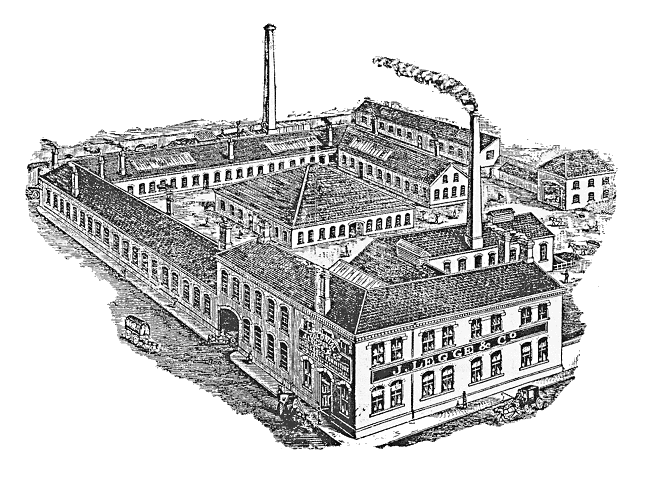 Over the years he would add a full range of cylinder, mortice,
cabinet and rim locks. The standards that were set in terms of
quality products and good working conditions have been developed under
the name J. Legge. In 1888
Mr. Legge purchased the business of the
late Joseph Collett and Sons, situated in Stafford Street,Willenhall and
surrounded by vacant plots of land, which Joseph Legge with exemplary
foresight, gradually acquired. Tools and patterns accumulated and
the range of products was widened to include locks for buildings,
cabinet locks and locks for travelling cases. The firm set up its own
foundries for brass and malleable iron and, for those days a good,
plating shop. By 1914, 250 people were being employed and the
firms products were finding their way to ready markets in Australia, New
Zealand, South Africa and India.
| This advert comes
from Peck's trade directory of 1896. The name of the factory is given as Colonial Works.
The advert lists innumerable
types of locks but adds "naval, cabinet, and builders' brassfounders, also cash box locks and handles, vase mountings
etc.", indicating that they did not only make locks.
The "Real Patent Rim Locks" (shown to
the right in the advert) are said to be "suitable for the
Australian markets". |
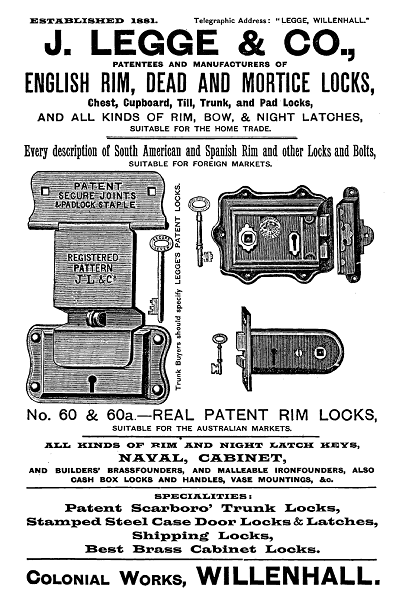 |
As a result of doing war work, the eyes of the
manufacturers were opened to the increase of efficiency that could be
obtained from the more extensive use of machinery. The whole trade
was stimulated and, indeed almost revolutionised. The older
generation of locksmiths suffered hardship during the change over in
manufacturing methods; but the skill passed from the locksmith to the
toolmaker and Joseph Legge was a front-runner in the changes. From
1900 Mr H Herman Chilton, as a co-director, ably assisted Mr. Legge.
After the 1939-45 war Mr. Legge was joined in the business by three of
his five sons.

A letterhead from 1937.
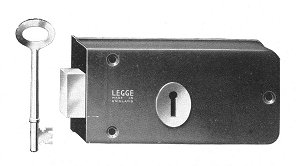 |
The company adopted a novel trademark. While on
holiday in the Isle of Man Mr. Legge found himself studying the
famous symbol of three legs. Struck by the design he was
determined to adopt it as a trade mark; but it was not without
the greatest difficulty that he secured permission.
The
sign of the three legs is still used today and, in the post war
period, was a symbol of his three sons actively engaged in the
business. |
|
In the early 1950s they started to manufacture a
cylinder pin tumbler lock, the development work for which was carried
out by Bernard Perrins.
(C Terry 7-9-99)
In the late 1960s early 1970s they took over William
Pinson and Son Ltd (q.v.) of Holdfast Works, Cemetery Road, whose
premises were adjacent to Legge’s works. That gave them more space
but they did not continue with the Wm. Pinson range of Holdfast
padlocks.
In July 1988 Legge became part of the Newman Tonks Group
PLC for £19.2 million. There they became part of their Locks and
Security Division, and changed their name to NT LOCKS (Manufacturers of
Legge and Erebus Locks). (The Erebus Company had been a member of the
Newman Tonks Group for some years).
With the acquisition of Legge,
the Erebus manufacturing facility at Lichfield Road, Wednesfield was
closed and the manufacture of a few items of the Erebus range moved to
the Moat Street works in 1991.
|
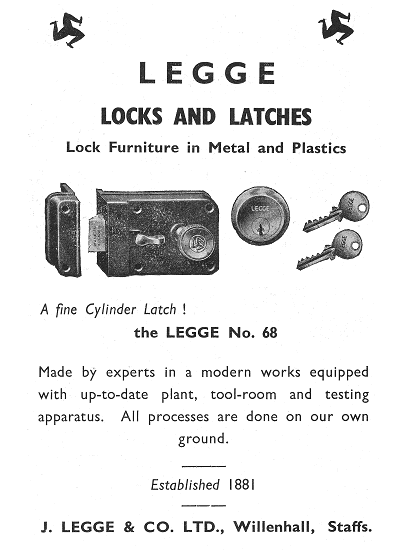
An advert from 1953. |
|
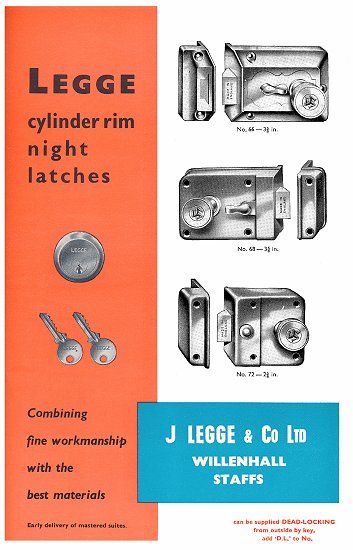
An advert from 1958. |
The Newman Tonks organisation had previously dabbled in
lock manufacture when, in 1975, they set up a lock making division in
Birmingham; this was later transferred to N-T. (Oldham) Ltd (qv), Eden
Works, Honeywell Lane, Oldham, Lancs, (at Oldham in April 1975).
But it never produced in any quantity, mainly due to lack of expertise.
It was closed in December 1976 when the lock making division was
transferred back to Birmingham but production never re-commenced.
Newman Tonks then set up Fleet Lock (q.v.), as a
subsidiary of their Cartwright door closer division, in Straight Road,
Short Heath, where they manufactured cheap, two-lever mortice locks.
This manufacturing unit was later incorporated into the Erebus Company
when they were acquired and moved to a new site at Lichfield Road
Wednesfield.
In 1989 Newman Tonks also acquired part of TESSA, a
Spanish lock maker, and the USA based Falcon Locks, enabling them to
sell a full range of locks to US customers. Falcon's contribution
was particularly the Knob Set.
In June 1994 Newman Tonks sold its majority interest in
NT Harloc, based in Kentucky USA. The 85% holding has been bought
by TESSA Inc., the US arm of the big Spanish lock and security
manufacturers, Herrajes TESSA in which NT also have a large stake. |
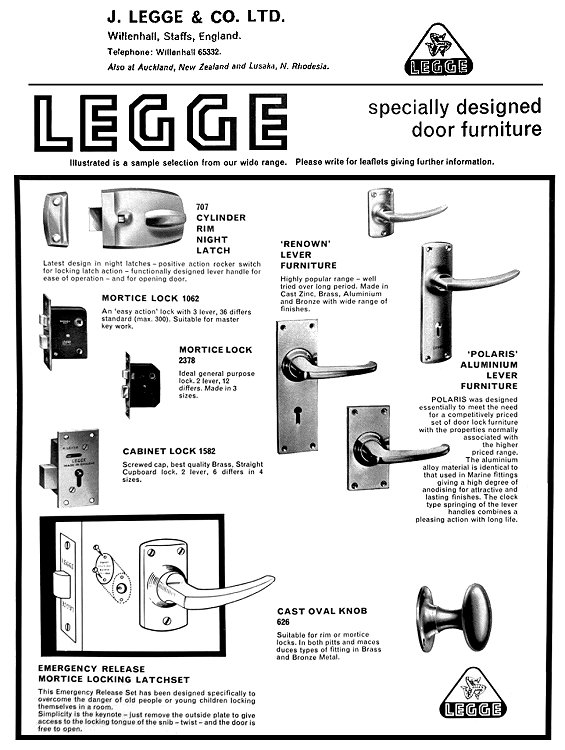
An advert from 1961.gazlegge.htm
| Harloc, based in Taylorsville, assembles, packages and sells TESSA made
locks and knobs, mainly into the residential building sector of the US
and Canada. NT; and TESSA have agreed that TESSA should now take
control of the distribution of its own products into the North American
residential hardware market, allowing NT to concentrate on the contract
hardware market for commercial products. NT will keep its 33.3%
holding in TESSA. (Birmingham Post 15-6-94) Nov. 1994 employed
approx. 270 (per Quality Questionnaire to A. Hough) (Men of the
Midlands-Mr. Joseph Legge) |
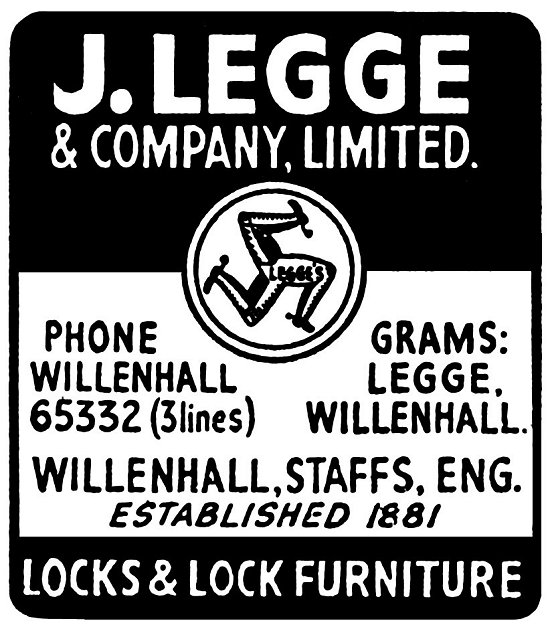
An advert from 1964. |
The Newman Tonks organisation were taken over by
Ingersol Rand in 1997 and, on the 5th May 1998, NT Legge,
which was part of Newman Tonks Group Ltd. became known as Ingersoll-Rand
Architectural Hardware a division of Ingersoll-Rand Architectural
Hardware Group Ltd.
(Letter 5 May 1998 from Ingersoll-Rand)

On the 1st November 2000 the name was changed
to IR Security & Safety Limited. This was in line with Ingersoll Rand
Company's launch of a new identity to better reflect its product
portfolio and marketing strategies. The most dramatic change was
that altering the corporate name from Ingersoll Rand Company to IR
Company. (IR Architectural Hardware letter 27 October 2000)
Moat Street Works closed in about 2004 and lock
production moved to Allegion, at Aston, Birmingham. The Moat Street site
has been derelict since closure and was badly damaged in an arson attack
in February, 2011.
|
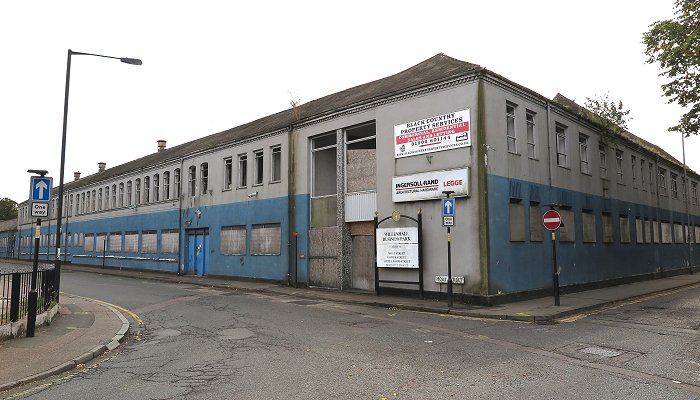
Moat Street Works in 2014. |
|
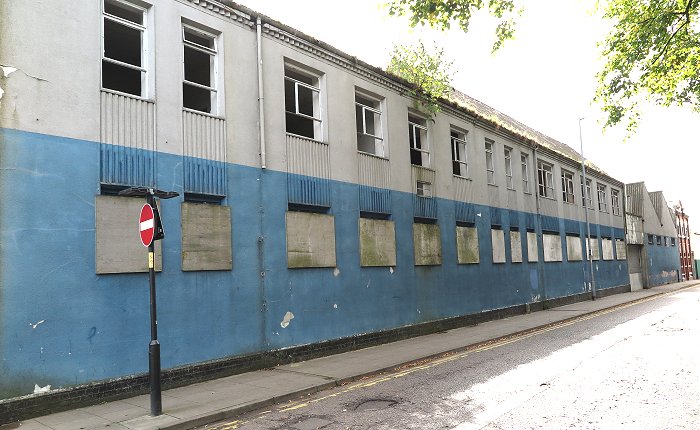
Moat Street Works in 2014. Looking
along Stafford Street. |
|

Moat Street Works in 2016. |
|
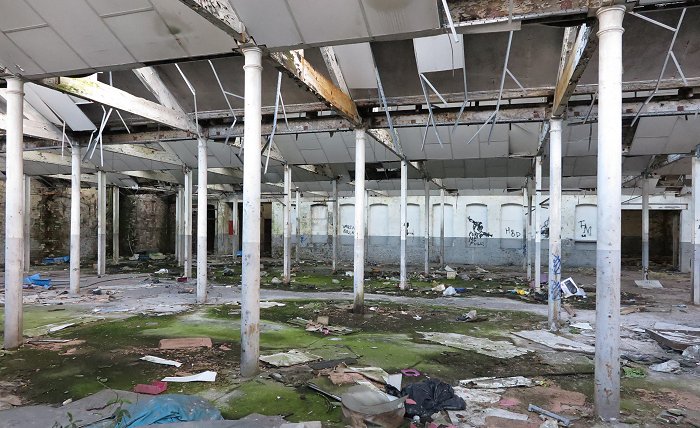
Moat Street Works seen
through an open window in Moat Street in 2020. |
|
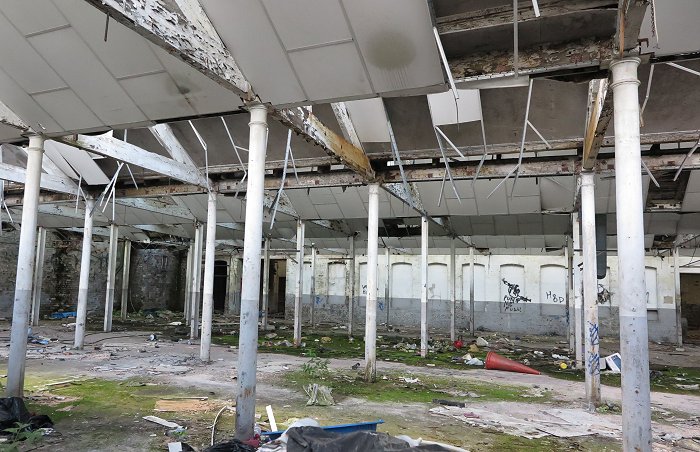
Moat Street Works seen
through an open window in Moat Street in
2020. |
|
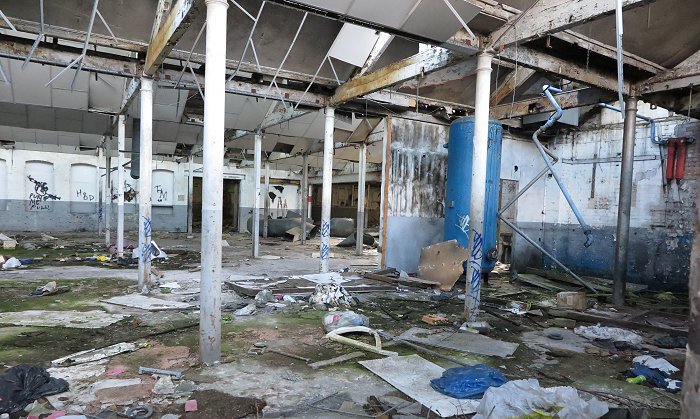
Moat Street Works
seen through an open window in Moat
Street in 2020. |
 |
Return to the
previous page |
|